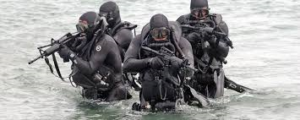The Lowdown on Navy SEAL Leadership

By Debbie Gregory.
Rear Adm. Tim Szymanski, named to assume command of the Naval Special Warfare headquarters in Coronado this summer, was confirmed for promotion to a second star by the U.S. Senate.
But questions have been raised by Rep. Duncan Hunter, a Marine Corps veteran who asked for an investigation of contracts that Szymanski played a role in earlier in his career.
The congressman, a member of the House Armed Services Committee, asked Defense Secretary Ashton Carter to investigate Navy SEAL training contracts for evidence of insider dealings by Szymanski. Hunter said he would stick to his demand for investigative scrutiny and continue to speak out against Szymanski’s rise to the top SEAL job in Coronado until he was satisfied.
A retired SEAL, Eric Deming of Virginia, wrote to Hunter saying that a 2008 formal complaint Deming filed alleging nepotism and misconduct led to reprisals that destroyed his career.
Bill Wilson, who retired as a Navy SEAL captain in 2014 and who served with Szymanski said, “Right when we need a good Naval Special Warfare leader, for Duncan Hunter to do this is baffling. I know all of these guys, and Tim is the best leader of all of his peer group.”
Wilson noted that Szymanski was co-author of the SEAL “Ethos,” a set of personal and professional codes that Naval Special Warfare adopted in 2005.
Meanwhile, Rear Adm. Brian Losey, the SEAL commander slated for retirement this summer after political pressure sunk his promotion to a second star, has broken his silence about what his camp calls a deeply flawed process for investigating military wrongdoing.
“I remain fully accountable for my actions in command. The highest priority of any line commander is in ensuring that our service members have the resources, guidance and empowerment to succeed,” Losey said.
Military Connection salutes and proudly serves veterans and service members in the Army, Navy, Air Force, Marines, Coast Guard, Guard and Reserve, and their families.

















